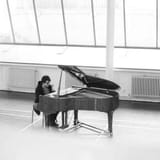Debashish Chaudhuri
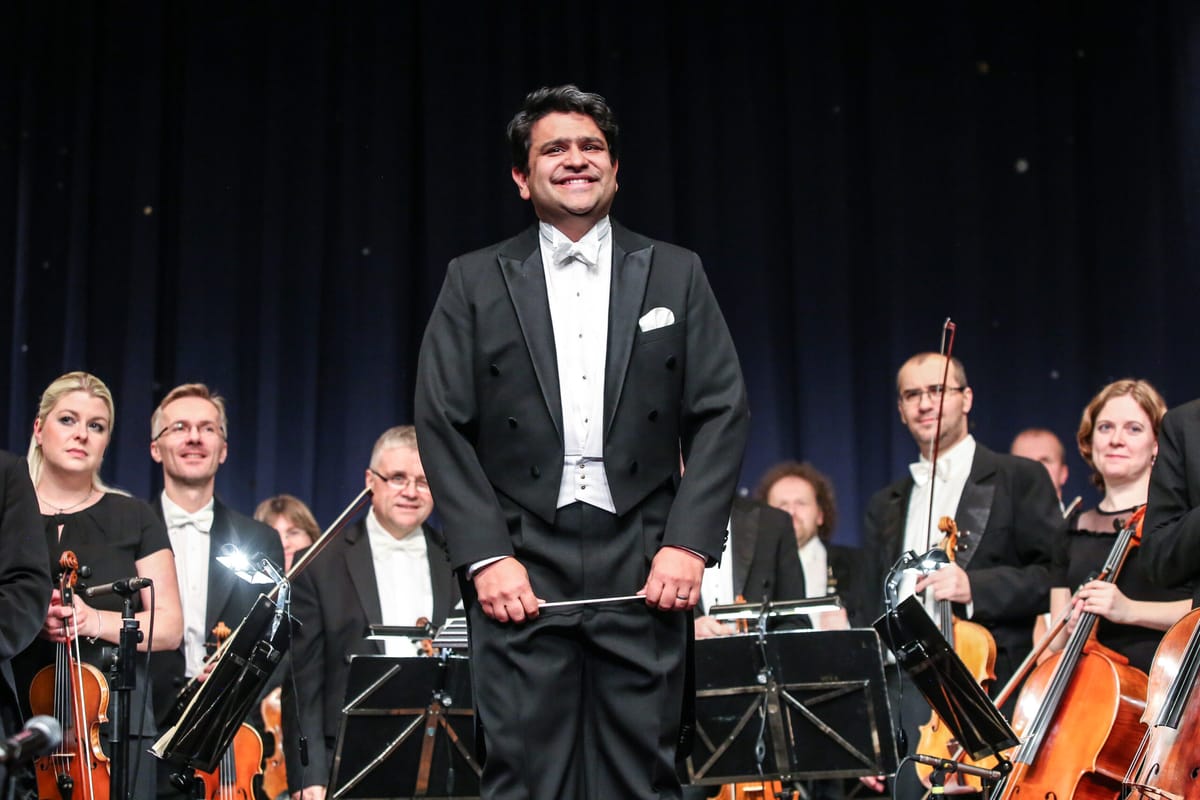
Nikhil Sardana: What inspired you to pursue a career in Music? When did you decide to start conducting?
Debashish Chaudhuri: I have always been extremely passionate about music, even before I could walk. I guess this love was kindled by my parents, both of whom love music. Ever since I remember, there was always some music playing in the house. Even my grandparents – we all were lovers of music and in Bengal, it’s quite normal to have all sorts of songs sung in the house throughout the year. All my grandparents played something or the other; and my parents too, though, none professionally or even publicly. Personally, I have a rather strong will I know; so when I decide on something, there is very little that can change my mind. That is something of an asset now, as a conductor I admit.
NS: Tell us about your family. How important was their support towards encouraging you to take this up professionally?
DC: India isn’t typically a country where society would encourage a musical career with the same enthusiasm and awe, as in the West, not even in Calcutta. I recall several people discouraging me when I decided not to further my academics and concentrate on music alone. Fortunately, those people weren’t my parents or some other very key people, who believed in me and gave me that space to grow in the way that they all felt was natural for me. It’s something that I am extremely grateful to God for having been blessed with. My parents, even though not sure of how things would eventually look like, had the foresight and knew me well enough to let me follow my dreams, on my own.
Music was something that truly and deeply fulfilled me. I knew well before my teens that music had to be a part of my life, which was quite early on. I don’t mean to say that I wanted to be a conductor at once, at that early age. In fact my family isn’t connected to any European classical music. I have gone through a lot of instrumental and choral music in my early years. My job at St James, as well as the association with the All India Radio and Calcutta School of Music gave me a lot of experience in the field of accompaniment and arranging. So, it was professional actually, a lot before I even left school. My quest for learning and absorbing the ways of the European music worked out eventually and that naturally led me to the Classical genre; where I soon found and discovered the role of a conductor.
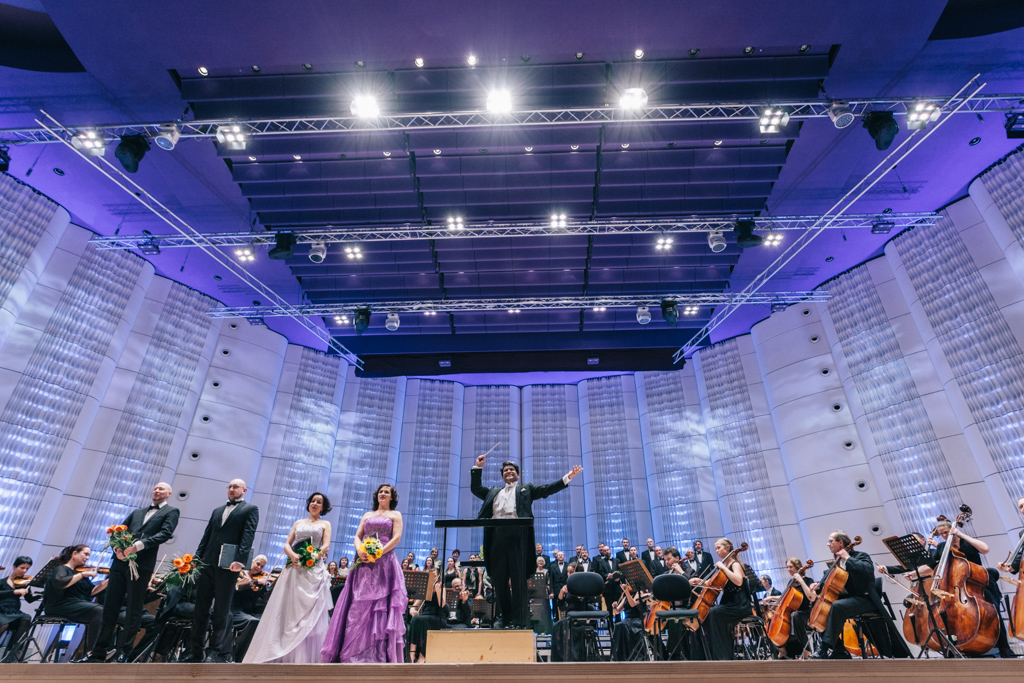
NS: When did you first move to the Czech Republic? Who influenced you the most while studying at the Prague Conservatory?
DC: I came to Prague in 1998, for the first time and then moved here permanently in 2000. I suppose, the influence here was at various stages and by various individuals. Not only one’s teachers, but also the fact that you can come into such close contact with such great international musicians and talk to them, hear their views and share their experiences. So many names were just on the labels of cassettes and records for me and suddenly, you are talking to them without any ”false barriers”! My love for Dvořák’s music was cemented very early on due to the closeness I developed quite by chance, with his descendants and family; they are among my closest and oldest friends here now.
NS: When and where did your conducting debut take place?
DC: The first professional engagement would have to be around 2004 at the Janáček Festival in his Silesian hometown of Hukvaldy, at the annual festival. I had a repertoire of Janáček and Martinů among others.
NS: How did you get involved with the Martinů Czech Philharmonic?
DC: I actually conducted them first in 1998 when I came to the Czech Republic, but that was a part of the courses. Professionally, I was invited in 2013 and it was one of those orchestras, which was a ‘love at first sight’ situation, both ways. I can’t even recall how many concerts we have done in the subscription series and several festivals since then. For me, it was the natural choice for the orchestra, when we toured India in 2016.
NS: Tell us about the repertoire for your upcoming tour across India.
DC: We will be playing another part from Bedřich Smetana’s Má vlast (My country) – ”Z českých luhů a hájů” (From the Bohemian Fields and Meadows). We did the Vltava from this same cycle, the last time. Then my wife Jana will be doing a solo in Rachmaninoff’s 2nd Piano Concerto. This will be followed by Dvořák’s 8th symphony. We did the 9th, the last time.
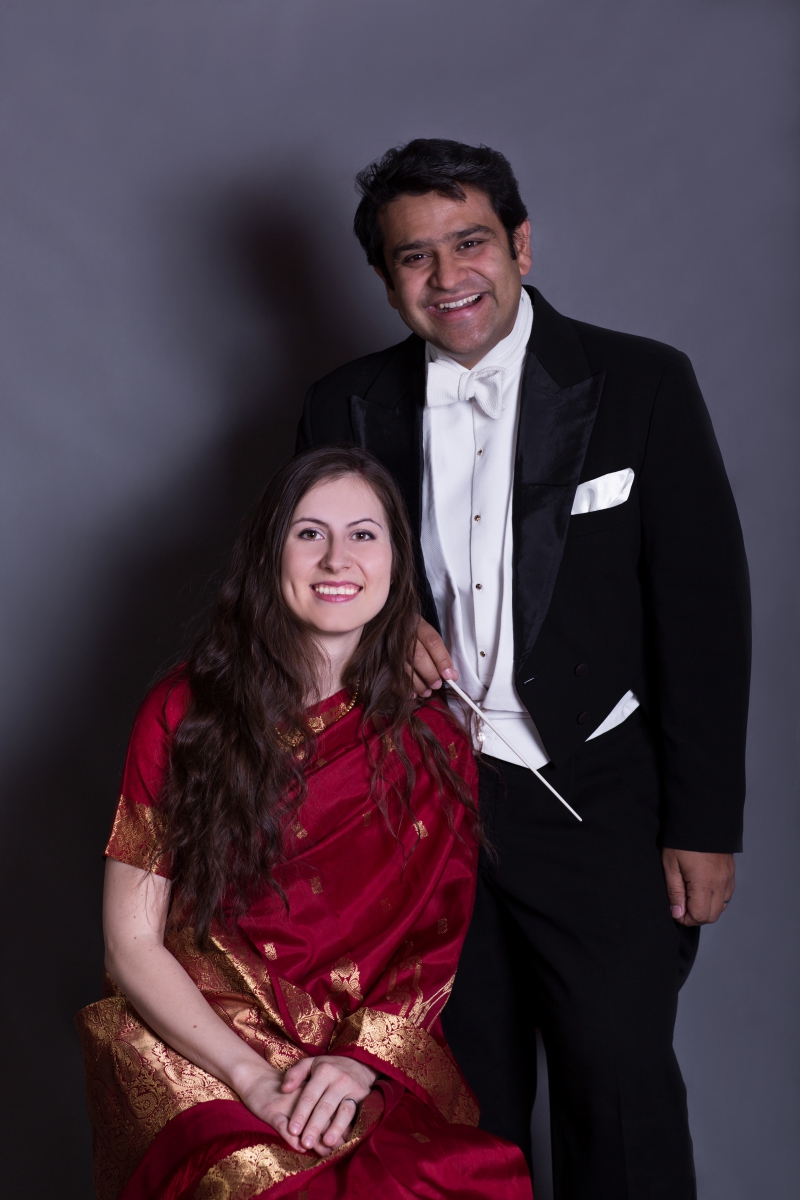
NS: What have been some of your greatest challenges as one of the very few Indian conductors in the world of Western classical music?
DC: Time I guess was the biggest challenge. Being a non European conductor isn’t all that rare, there are so many now and they are often better received than the native ones today. Sometimes it is an advantage as well as you are not marred by tradition as Mahler put it so nicely, ‘tradition is the best source of laziness/ slackness’. I guess that there were challenges but I never took them in that light and I don’t really want to start thinking that way now, after so many years. Whatever they may have been, one had to cross them if one wanted to get to one’s goals. Sometimes it’s better not to know the problems and challenges beforehand.
NS: What is your advice for aspiring musicians in India? Tell us about your sponsorship activities here.
DC: Not to be afraid of hard work and disappointments. Talent is just the very beginning. My wife and I decided a few years back to start a family scholarship for Indian citizens, based out of India, who wish to further their knowledge in European classical music. Since 2016, in connection with the Calcutta School of Music, we sponsor such people to attend the now 25 year old Ameropa Music Courses in Prague; where over the summer months, they come into contact with others from around the world and teachers; who guide them in a very intense concert filled course in solo and chamber music. The course can be attended by anyone who doesn’t get the scholarships as well, as they are paid and open to all who reach the standards required. Our goal is to make a bridge for people like myself and give them that chance to see if they can fulfil their dreams. I believe they need to see, come here and learn, it’s not possible in India yet beyond a certain level. I hope that one day it will be. The talent is a massive resource in India we believe.
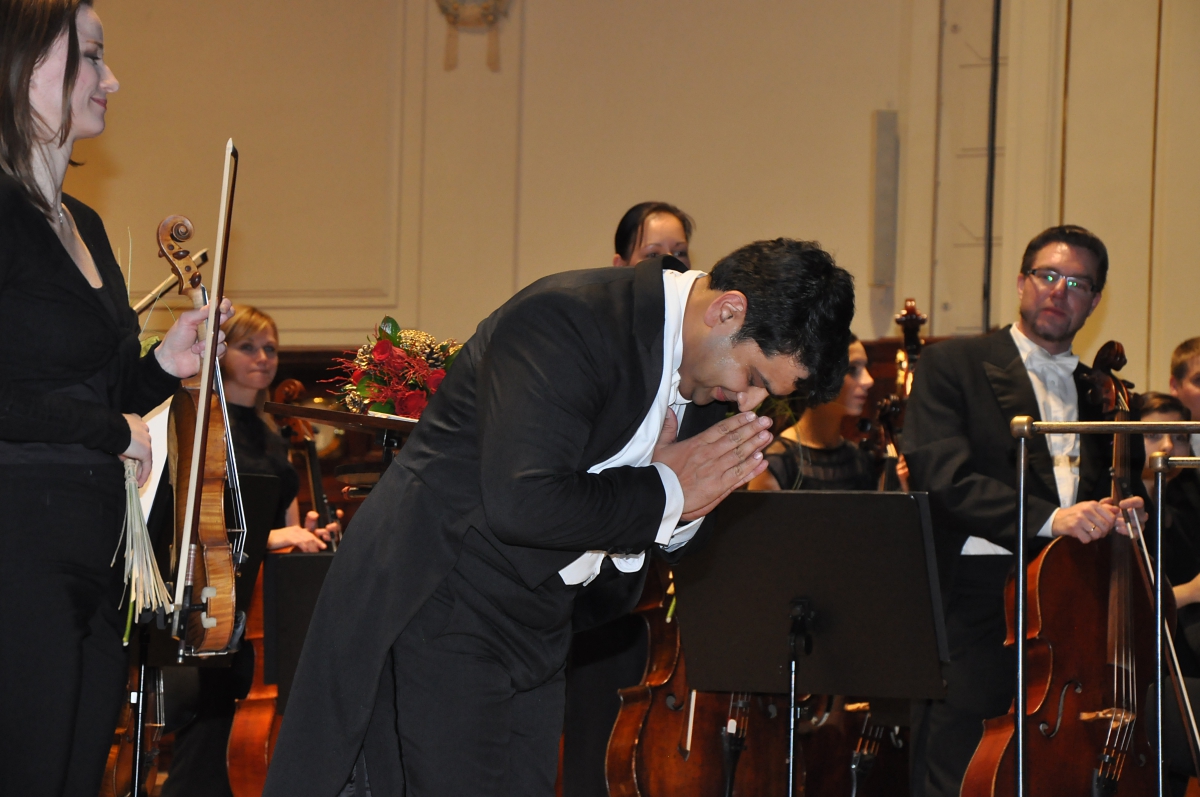
India Tour 2018 Schedule
12.01.2018, New Delhi
SiriFort Auditorium at 7:30 pm (registration for attendance: http://zip.er.cz/concert)
14.01.2018, Mumbai
Tata Theatre, NCPA at 7pm (tickets available at the NCPA office)
17.01.2018, Goa
Kala Academy at 6:30 pm (complimentary passes at Trail Blazer Tours office no. 201-204, 2nd Floor Gera´s Imperium 2 Building, Patto Plaza Panjim. Ms. Reena Pereira 91-832-6456467)
19.01.2018, Kolkata
Kala Mandir at 6:30 (donor passes at Calcutta School of Music office 11am-5pm Mon-Fri, Mrs. Rupa Chatterjee Ray, (033)24615375 or (033)24615294)

The Bohuslav Martinů Philharmonic Orchestra
The idea of founding a symphony orchestra in Zlín arose back in the 1920s, and the basis of the Bat’a National Enterprise Symphony Orchestra was formed shortly after the country’s liberation on 1st June 1945, The first performance of the orchestra, numbering almost fifty musicians, was conducted by Rudolf Kvasnica on 30th April 1946. In May 1950, what was now the Workers’ Philharmonic Orchestra started its first spa season in Luhačovice, and its performances for the spa guests over the five summer months set a precedent for many subsequent years. In November 1955 the Tomas Bat’a Memorial Building was repurposed as the ‘House of Arts’ for the Orchestra’s needs. Over the years the Orchestra has seen several changes of name – from the Bat’a National Enterprise Symphony Orchestra to the Workers’ Philharmonic Orchestra, then the Gottwaldov Region State Symphony Orchestra, but it was in early 1989 that it was renamed the Bohuslav Martinů Philharmonic Orchestra.
It has gradually become an important Czech orchestra whose artistic profile has been honed by a series of outstanding chief conductors and permanent or guest conductors such as Rudolf Kvasnica, Richard Týnský, Eduard Fischer, Jaroslav Opěla, Rostislav Hališka, Stanislav Macura, Petr Altrichter, Miloš Machek, Peter Lűcker, Kirk Trevor, Tomáš Koutník, Jakub Hrůša, Stanislav Vavřínek and others. Since the 2015-2016 season the chief conductor has been Vojtěch Spurný, and the principal guest conductor is Leoš Svárovský.
Among the outstanding soloists who have performed with the Orchestra are Paul Badura-Skoda, Mstislav Rostropovich, Daniel Schafran, Mischa Maisky, Vadim Repin, Jennifer Larmore, Eugen Indjić, Sergej Krylov, Libuše Domanínská, Eduard Haken, Josef Suk, Ivan Moravec, Dagmar Pecková, Eva Urbanová, Gabriela Beňačková, and Magdalena Kožená. In recent years the Orchestra has also accompanied Rolando Villazón, Montserrat Caballé, Olga Peretyatko, Joseph Calleja, Angela Gheorghiu, Pretty Yende, David Lomeli, Adam Plachetka and others. The concert on 28.04.2016 marking the Orchestra’s 70th anniversary featured the pianist Fazil Say.
The Orchestra’s repertoire consists of major symphonic works, but includes jazz, chanson and popular music, and it invites guests performers and musicians not only from the world of classical music but in other musical genres too. The Orchestra’s concerts are currently organised in six subscription series, but it performs in many other concerts in Zlín and the region, touring all the country’s major musical festivals such as the Prague Spring, the Smetana festival in Litomyšl, the Janáček May festival in Ostrava, the Brno Špilberk, the Prague Music Festival, Český Krumlov and elsewhere. Tours abroad have taken the orchestra to Italy, Denmark, Hungary, Croatia, Greece, Poland, Austria, Romania, Germany, France, Portugal, Spain, Ukraine and the USA (Carnegie Hall). In 2016 the Orchestra performed in India – some 57 years after the last performance there by a Czech orchestra, and in November 2017 it gave five concerts on a tour of South Korea.
Since 1972 the Bohuslav Martinů Philharmonic Orchestra has staged the unique Talentinum international festival showcasing young performing artists, and it also organizes the Harmonia Moraviae international music festival in autumn.
The Orchestra features regularly on radio and TV and in recording sessions. Since January 2011 it has been based in the newly built Zlín Congress Centre, designed by the noted Czech architect Eva Jiřičná.

